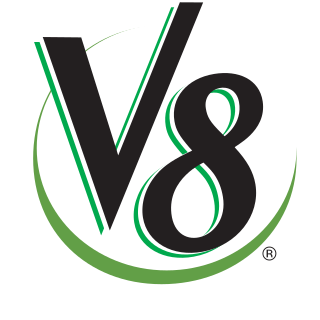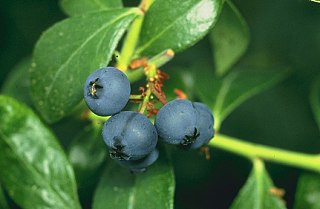
A berry is a small, pulpy, and often edible fruit. Typically, berries are juicy, rounded, brightly colored, sweet, sour or tart, and do not have a stone or pit, although many pips or seeds may be present. Common examples of berries in the culinary sense are strawberries, raspberries, blueberries, blackberries, white currants, blackcurrants, and redcurrants. In Britain, soft fruit is a horticultural term for such fruits.

Minute Maid is an American brand of beverages, usually associated with lemonade or orange juice, but which now extends to soft drinks of different kinds, including Hi-C. Minute Maid is sold under the Cappy brand in Central Europe and under the brand "Моя Семья" in Russia and the Commonwealth of Independent States. Minute Maid was the first company to market frozen orange juice concentrate, allowing it to be distributed throughout the United States and served year-round. The Minute Maid Company is owned by The Coca-Cola Company, the world's largest marketer of fruit juices and drinks. The firm opened its headquarters in Sugar Land Town Square in Sugar Land, Texas, United States, on February 16, 2009; previously it was headquartered in the 2000 St. James Place building in Houston.

V8 Vegetable Juice, sometimes simply referred to as V8, is a trademarked name for a number of beverage products sold worldwide that are made from eight vegetables, or a mixture of vegetables and fruits. Since 1948, the brand has been owned by The Campbell's Company.

Hawaiian Punch is an American brand of juice currently manufactured by Keurig Dr Pepper, originally invented in 1934 by A.W. Leo, Tom Yeats, and Ralph Harrison as a topping for ice cream. It was started from an original syrup flavor titled Leo's Hawaiian Punch, containing orange, pineapple, passion fruit, guava and papaya, and has been available in 14 flavors since 2020. Though earlier versions contained 10% fruit juice, the drink is currently made with 3% fruit juice.

Five Alive is a line of fruit juice blends created by Minute Maid, a subsidiary of The Coca-Cola Company. Both the name and the five colors of the logo refer to the five fruit juices each variety contains.

Merbein is a town just north of Mildura, Victoria, in the Sunraysia region of Australia. It is on the Calder Highway between Mildura and the Murray River crossing at the Abbotsford Bridge to Curlwaa. At the 2016 census, the town had a population of 1,981. Merbein is 12 kilometres from Mildura, 553 kilometres (344 mi) from Melbourne and 389 kilometres (242 mi) from Adelaide.

Hi-C is an American fruit juice-flavored drink made by the Minute Maid division of The Coca-Cola Company. It was created by Niles Foster in 1946 and released in 1947. The sole original flavor was orange, with additional flavours introduced in subsequent years.

In botany, a berry is a fleshy fruit without a stone (pit) produced from a single flower containing one ovary. Berries so defined include grapes, currants, and tomatoes, as well as cucumbers, eggplants (aubergines), persimmons and bananas, but exclude certain fruits that meet the culinary definition of berries, such as strawberries and raspberries. The berry is the most common type of fleshy fruit in which the entire outer layer of the ovary wall ripens into a potentially edible "pericarp". Berries may be formed from one or more carpels from the same flower. The seeds are usually embedded in the fleshy interior of the ovary, but there are some non-fleshy exceptions, such as Capsicum species, with air rather than pulp around their seeds.

Polar Beverages is a soft drink company based in Worcester, Massachusetts. It is a manufacturer and distributor of sparkling fruit beverages, seltzer, ginger ale, drink mixers, and spring water to customers in the United States. It is the largest independent soft-drink bottler in the United States.
A seedless fruit is a fruit developed to possess no mature seeds. Since eating seedless fruits is generally easier and more convenient, they are considered commercially valuable.

Blueberries are a widely distributed and widespread group of perennial flowering plants with blue or purple berries. They are classified in the section Cyanococcus within the genus Vaccinium. Commercial blueberries—both wild (lowbush) and cultivated (highbush)—are all native to North America. The highbush varieties were introduced into Europe during the 1930s.
Generally, fleshy fruits can be divided into two groups based on the presence or absence of a respiratory increase at the onset of ripening. This respiratory increase—which is preceded, or accompanied, by a rise in ethylene—is called a climacteric, and there are marked differences in the development of climacteric and non-climacteric fruits. Climacteric fruit can be either monocots or dicots and the ripening of these fruits can still be achieved even if the fruit has been harvested at the end of their growth period. Non-climacteric fruits ripen without ethylene and respiration bursts, the ripening process is slower, and for the most part they will not be able to ripen if the fruit is not attached to the parent plant. Examples of climacteric fruits include apples, bananas, melons, apricots, tomatoes, as well as most stone fruits. Non-climacteric fruits on the other hand include citrus fruits, grapes, and strawberries Essentially, a key difference between climacteric and non-climacteric fruits is that climacteric fruits continue to ripen following their harvest, whereas non-climacteric fruits do not. The accumulation of starch over the early stages of climacteric fruit development may be a key issue, as starch can be converted to sugars after harvest.
This article summarizes different crops, what common fungal problems they have, and how fungicide should be used in order to mitigate damage and crop loss. This page also covers how specific fungal infections affect crops present in the United States.

Foodscaping is a modern term for integrating edible plants into ornamental landscapes. It is also referred to as edible landscaping and has been described as a crossbreed between landscaping and farming. As an ideology, foodscaping aims to show that edible plants are not only consumable but can also be appreciated for their aesthetic qualities. Foodscaping spaces are seen as multi-functional landscapes that are visually attractive and also provide edible returns. Foodscaping is a method of providing fresh food affordably and sustainably.

The Indian Institute of Horticultural Research (IIHR) is an autonomous organization acting as a nodal agency for basic, strategic, anticipatory and applied research on various aspects of horticulture such as fruits, vegetable, ornamental, medicinal and aromatic plants and mushrooms in India. The institute has its headquarters in Bengaluru, Karnataka, India and is a subsidiary of Indian Council of Agricultural Research (ICAR), New Delhi, under the Ministry of Agriculture, India. It recently has been ranked 1st for the combined years 2019-20 and 2020–21 by the ICAR.

Bodyarmor SuperDrink is an American sports drink brand owned by The Coca-Cola Company. Products launched under the brand include: Sports, "Lyte" Sports, "Edge Sports," and "SportWater".
The horticulture industry embraces the production, processing and shipping of and the market for fruits and vegetables. As such it is a sector of agribusiness and industrialized agriculture. Industrialized horticulture sometimes also includes the floriculture industry and production and trade of ornamental plants.

Geist is a distilled beverage obtained by maceration of unfermented fruit or other raw materials in neutral spirits, followed by distillation. This differs from fruit brandy, where the alcohol comes from fermenting the fruit's naturally occurring sugars. As such, geist can be made from a much wider range of materials, as it is not limited to fruits with sufficient fermentable sugars.














